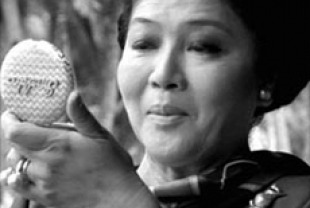The long and extravagant reign of Ferdinand and Imelda Marcos in the Philippines came to an abrupt end in 1986 when the People Power Revolution sent them into exile in Hawaii. In this fascinating documentary, Ramona S. Diaz looks at this glamorous woman and her views on subjects ranging from beauty to art to politics. More than anything else, Imelda is a riveting view of the winning class and what it is like to be insulated by wealth and illusion from real life and the struggles of ordinary people.
You probably remember the quip "Mrs. Marcos can change her shoes for eight years without ever wearing the same pair twice." She began her ascent into power and wealth as a beauty queen who was dubbed "the Muse of Manila." It was her destiny to be the first to sing the new Filipino national anthem composed by Irving Berlin. Eleven days after meeting Ferdinand Marcos, Imelda married him, confident that he would be able to provide the extravagant lifestyle that she felt was naturally in her future. After discovering that he enjoyed the attention and favors of other women, or had "a roving eye" as she put it, Imelda decided to seek her personal glory in public life. He was elected President in 1956, and she created her own image as a beautiful, classy, and shrewd representative of the Philippines in travels around the world. At one point, Imelda even sang for the Pope, although she displeased the Vatican with her stand on birth control.
In the documentary one of her critics points with derision to Imelda's "edifice complex," referring to the cultural center and other monuments she had built to celebrate the art and spirit of the Filipino people. Following an incident when an assassin stabbed her, Imelda decided "to be totally selfless" devoting herself to "good-works projects." It is amazing to watch her paint a picture of herself as a saint while she ignores her complicity in her husband's dictatorship. Near the end of his rule, he proclaimed martial law and set up "camps" for some 17,000 political "dissidents" who did nothing except oppose his regime.
One of the most telling examples of Imelda's elitism is the lecture she gives on beauty, which she sees as both a discipline and an art. She reads from her book Circles of Life about this quality which she enjoys in the palaces, art works, and luxuries of her lifestyle, all while she overlooks the poverty of her people and the human rights violations of the Marcos regime. In one of the interviews, Imelda says that she has been very misunderstood. This hard-hitting documentary reveals her as an arrogant and graceful member of the winning class who still remains oblivious to the suffering and pain of the Filipino people. Power and money can blind.
Exclusive engagement begins June 9 at the Film Forum, New York City
